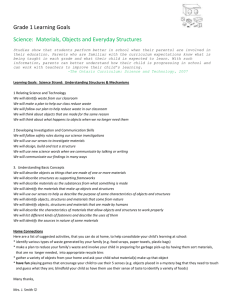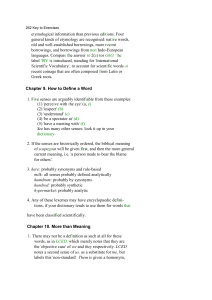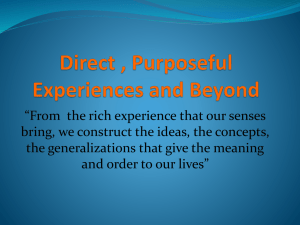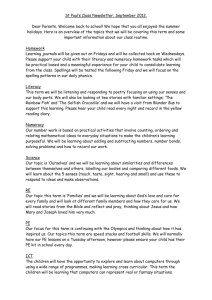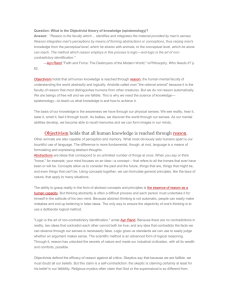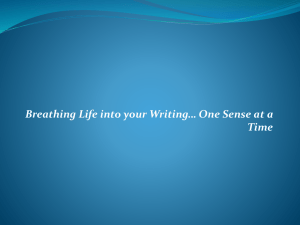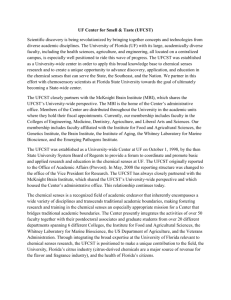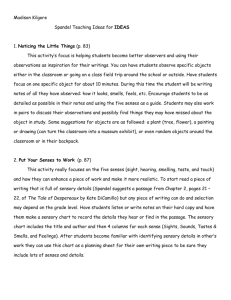truth essay
advertisement
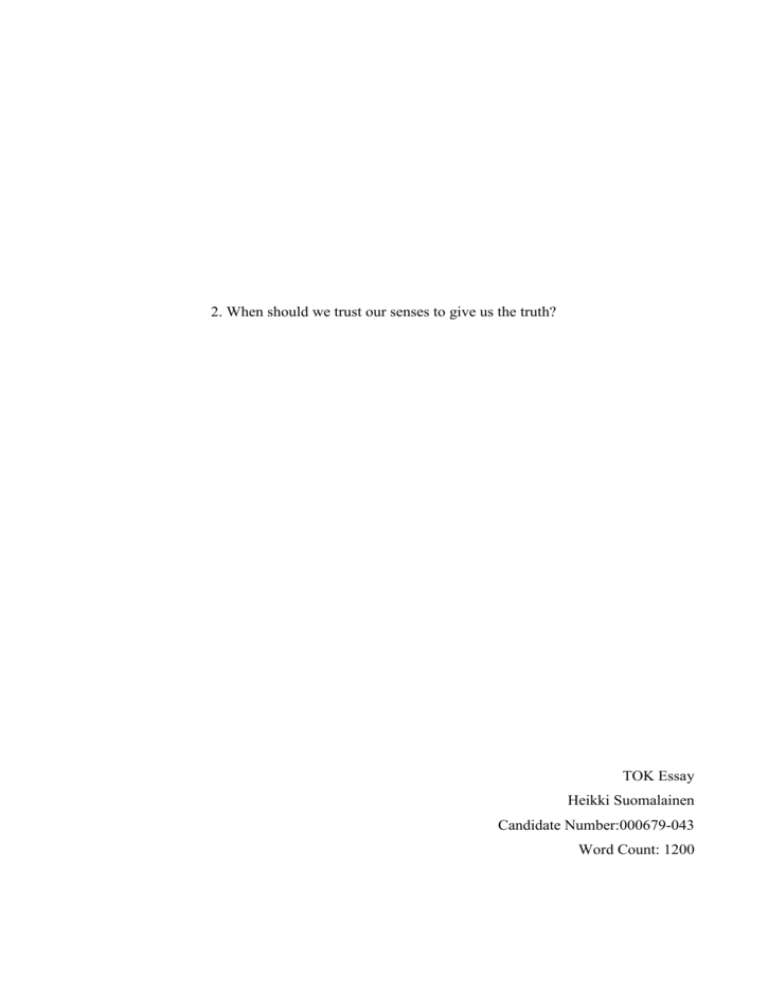
2. When should we trust our senses to give us the truth? TOK Essay Heikki Suomalainen Candidate Number:000679-043 Word Count: 1200 Human race has been granted many fabulous senses. To what extent can we trust these senses and more importantly when can we trust them. In some situations these senses can prove to lifesaving and in other they might prove to be fatal in most serious fashion. Let us expand our views on the topic by using common everyday situations as inspiring examples. First of all we should take a look what is truth. Truth is a rather common word used in every day language yet its specific definition is rather elusive. Let’s take a simple every day example. You see little Tim during your school day. You did not see little Tim during morning lessons and you enquire whether he was skipping the morning lesson or not. Tim responds to you as follows: “It’s true that I skipped the morning lesson.” Initially this would seem rather simple statement. You did not see little Tim attending class and he even told you himself that he was skipping. So is it true that Tim was skipping? In everyday life you could leave it at that and accept it as a truth that little Tim really was skipping. But since this is TOK essay there is NO way we can leave it at that. In order for little Tim’s statement to be true there should be some sort of universal laws defining the terms used in the sentence. Who defines what skipping means? We can take the used language, English in this case since it is the brutally enforced language in the study system this essay is part of, as our vocal point in defining what skipping means. Since English speakers are bound together by the history of all the other English speakers before them, there exists a general consensus what ‘skipping’ means, but then again language is by my definition a dynamic system of rules and definitions that are subjective in their fundamental nature. And because of this subjectivity and constant evolution of language it is impossible to set ultimate definitions to anything. The same activity little Tim defines as ‘skipping’, might be named in my set of definitions ‘creative free-time’ or maybe ‘involuntary recession of work moral’. To sum it up: Every person defines their own meanings for words and we are only able to arrive to some sort of approximation of the meaning the other participant of communication is trying to convey to us. And because of this uncertainty language can not ultimately define what truth is. Human senses are rather inaccurate. For example our eyesight can only provide us with very general information of our surroundings. These outside stimuli are then interpreted by our mind and then we arrive into some sort of conscious understanding of the situation. These interpretations can be affected by many different factors. Are we sleepy? Are we in a bad mood? Have we consumed any hallucinatory inducing products? Furthermore different sort of shapes and colours can distract our perception abilities and we might see something that is really not there. For example a spiral drawn in a special way with certain colour combinations might possibly make us believe that a stationary image is actually moving. Simple optic illusion and yet makes our twist and makes us unsure what really is in front of us. We live on daily basis supported by our senses that are 2 inaccurate, gullible and limited. Simple question: Why? The answer is simple; we do not have any other choice. All the information we have is gathered through our senses. If we would not rely on our senses we would have nothing. Trust is another rather elusive topic. It is a peculiar human trait that is in many cases based on emotional judgement rather than rigorous logical assessment. Many children trust their parents because they have always done so and think nothing of it. This is of course very handy since without certain level of trust it would be rather hard to maintain the kind of social infrastructure that humans are using. But on individual level blindly trusting every other individual yields the person prone to be abused in one way or another. Even though majority of people would be worth the trust given to you only need one person not worth trusting to soon find yourself lying in a ditch with a bloody knife struck between your liver and lungs. But as said every human interaction requires some level of trust, if it is not there you cannot even communicate with the person in question. To asses whether you can trust someone or not you need to asses the given situation with very limited knowledge. Let’s say you are walking down the street and you meet a person named Heli. Heli points her finger behind you and says: “Look out, that truck is going to drive you over.” You do not know that much about this individual named Heli, you have met her once or twice nothing more. The situation is new you in a sense that you have never witnessed a situation where a truck was going to hit a person. So you have very limited information of the situation and you basically have two choices. You either trust Heli and make a daring dodge towards the ditch on the side of the road and ruin your new coat and possible receive hearty laugh from Heli as she laughs to your gullible nature. Or then you choose to ignore Heli and risk getting your charming persona ripped apart by charging whirlwind of doom made out of metal and screaming rubber tires singing you funeral march. Whatever your decision may be you are going to make it in an instant based on very limited and questionable information. That is the essence of trusting something. Usually you base it in intuition in order to be able to make some sort of decisions instead of freezing up and getting pummelled by that truck for example. So when should we trust our senses to give us the truth? Taking a look at the previous truck example I believe the right answer is that always when we have no other way of verifying the information. Since senses are all that we have in most of the cases this means that we should trust our senses majority of the time. For example if we see a psychotic TOK-teacher who has snapped under the constant pressure and whose world view has been wrecked by students who in their laziness fail to realise the full potential of their astounding intellect charging you with a bloody axe, you most likely are not going start gathering observation data from people and calculating statistical 3 significance of the results. First of all it would severely impair the potential reaction of the participant most likely leading to an early death. In conclusion it can be easily argued that although human senses are mostly relevant in everyday life, their use in all of the situations that concern high level decision making is elementally flawed. This is due to the implied fact that human senses are prone to misinterpretation and they easily produce false information, in relation to the concept of truth defined earlier. 4

